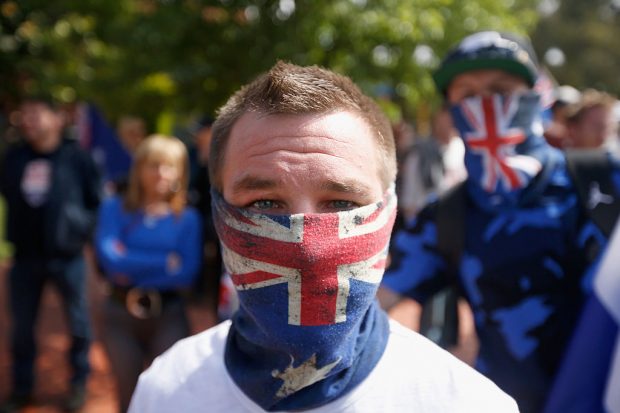 The return of One Nation at the 2016 federal election and the emergence of a series of small right-wing parties has sparked off cries that the extreme far-right is on the rise in Australia. But what are the limits of this description and who decides who is beyond the pale? In Europe, anyone who favours exiting the European Union is hit with charges of far-right populism.
The return of One Nation at the 2016 federal election and the emergence of a series of small right-wing parties has sparked off cries that the extreme far-right is on the rise in Australia. But what are the limits of this description and who decides who is beyond the pale? In Europe, anyone who favours exiting the European Union is hit with charges of far-right populism.
Tony Jones, probably in a fit of absent-mindedness, suggested that if a conservative party was to be established by Senator Cory Bernardi it could be called ‘Cory Bernardi’s Golden Dawn’, a reference to the gruesome neo-Nazi party that has maximised its support via the economic catastrophe impacting on Greece.
Bill Shorten, who should know better, routinely describes the conservative faction of the parliamentary Liberal Party as ‘the far-right’ and castigates Turnbull for ‘caving’ into them. Anyone who didn’t know better would think Turnbull’s conferring with his conservative parliamentary caucus is tantamount to Churchill cosying up to Oswald Mosley or George W. Bush negotiating with the Klan.
Christopher Hitchens said that there is a tendency on the left ‘to think that if someone in any way disagrees with the left it must be for the lowest possible reason and when you’ve found the lowest possible motive you have found the right one.’ Hitchens had considerable experience in dealing with fascism and was well travelled in many of the former authoritarian regimes now forgotten. As such the great scribe was more circumspect in assigning his intellectual opponents with irredeemable aspersions on their character or motives.
If the far-right constitutes a space on the political spectrum and if Hitler, Le Pen and Cory Bernardi are considered to occupy a space on that spectrum then the term essentially has no meaning.
Whether or not a specific definition of the far-right is possible or even necessary is beside the point. A working definition could be put simply as a reactionary politics or opinion that engages in extreme rhetoric or extreme actions. But it may be more useful to think not in terms of definition but of characteristics. Some groups demonstrate more of these characteristics than do others.
The extreme nature of the far-right has two unique characteristics that distinguish it from right-wing populism, the alt-right or ultra-conservatism. The first and most important is the role of violence in politics. Do they endorse violence, do their supporters engage in violence or has their recent tradition been one of violence? This aspect is very identifiable and would obviously include any neo-Nazi group, the Golden Dawn in Greece, or the British National Party (BNP) – many of whose members have violent pasts and voice justifications for racist violence.
The second set of characteristics relates to divergent opinions on a range of questions of history and identity issues. The less complicated of these would include the belief in the racial superiority of one specific group and the inherent inferiority of another. The BNP who oppose non-white immigration and the Hungarian Jobbik Party, which espouses vicious anti-Semitic and anti-Gypsy policies, are clear examples of this sort of race politics.
Also included are the parties that engage in unrestrained racial bigotry and who believe citizenship should be excluded from minority peoples like the Ukrainian Svoboda or the Bulgarian Attack Party. Though it need not only be from the far-right, those who advocate annexing lands where one’s own ethnic community are concentrated, known as irredentism, is a common feature of the far-right.
Next are parties that are in a state of denial and outright rejection of the historical record when it comes to the question of past crimes. Holocaust denial by neo-Nazis is the primary but not the only example of a group perpetuating false history out of a nationalistic desire to preserve the nation’s honour and sacred memory. Far-right nationalists in the Balkans engage in this sort of historical amnesia, denying the Srebrenica massacre for instance by Serbian extremists.
Further down the line is where parties continue an unhealthy relationship with their unreconstructed pasts. This is where many of the most successful far-right parties of Europe find themselves.
The National Front grew out of the ultra-rightest traditions of anti-Semitism, Vichy collaboration, French imperialism and OAU extremism. The intellectual founding fathers of the extreme right in France Pierre Poujade, Jean-Louis Tixier-Vignancour and co, cheered the Nazi-aligned Philippe Pétain when he agreed to act as a puppet for the Führer.
There is no such equivalent in Australia; however aspersions of Nazi equivalency are regrettably part and parcel of the modern political debate where it is acceptable to equate an opponent’s beliefs with the worst possible motivations.
One Nation, Rise Up Australia and the Australian Liberty Alliance may not be mainstream but they don’t rise to the level of the extreme far-right, they look and sound similar to the nativist parties of Europe and some parts of the right in the United States.
The United Patriots Front and Reclaim Australia mobs which engaged in thuggish violence in a number of recent rallies in Melbourne have unmistakably crossed the line of acceptable behaviour. John Howard was often derided as an old school right-winger but he would never lend succour to groups engaging in street brawling just as he and Tony Abbott sought to restrain the growth of Pauline Hanson in the late 90s.
There is what seems like a predetermined tendency to fear contrary and especially unapologetic conservative opinions as tantamount to far-right politics. Despite the absence of any of the characteristics of the extreme right mentioned above, the mere affirmation of a conservative mindset and a belief in things such as border integrity and the maintenance of social traditions is a red flag signalling malicious intent.
Got something to add? Join the discussion and comment below.
Get 10 issues for just $10
Subscribe to The Spectator Australia today for the next 10 magazine issues, plus full online access, for just $10.

























Comments
Don't miss out
Join the conversation with other Spectator Australia readers. Subscribe to leave a comment.
SUBSCRIBEAlready a subscriber? Log in